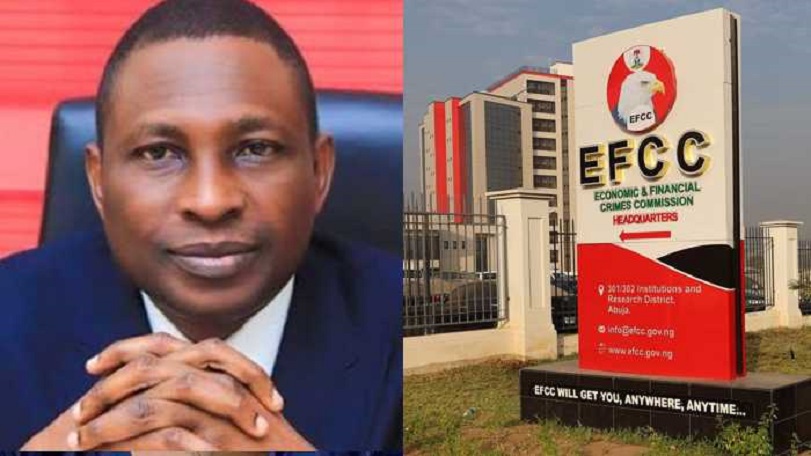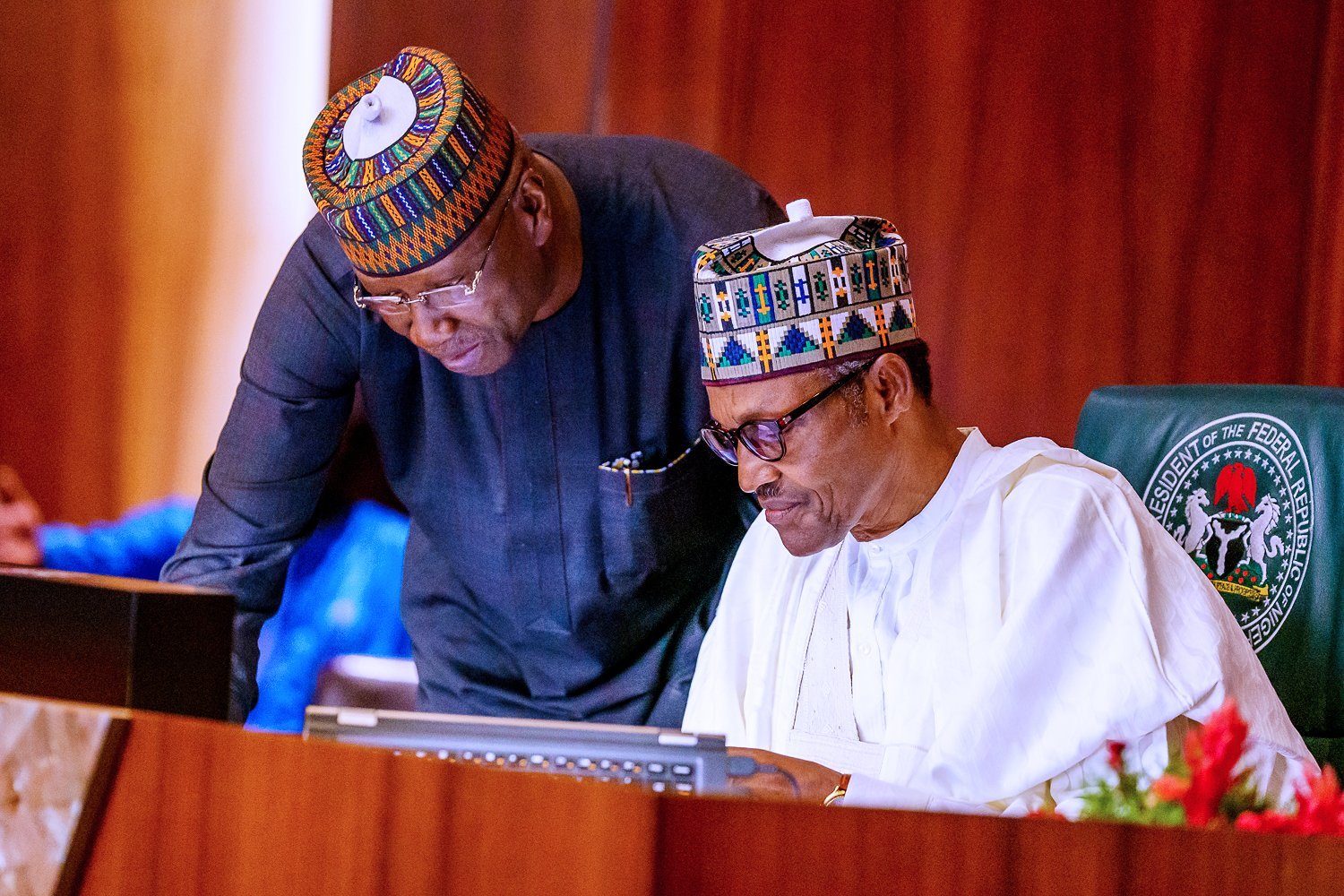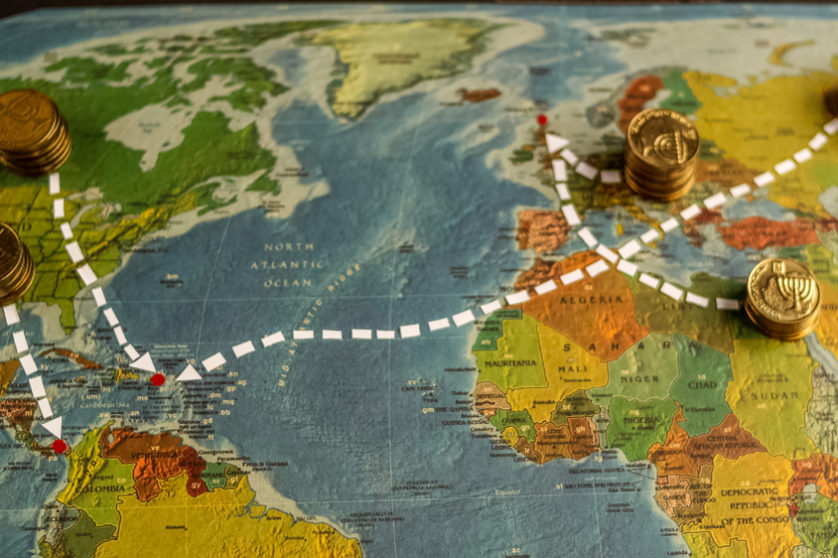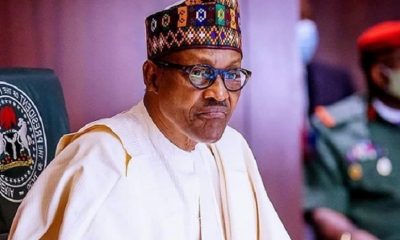Economy
Buhari Reaffirms Resolve to Tackle Illicit Financial Flows
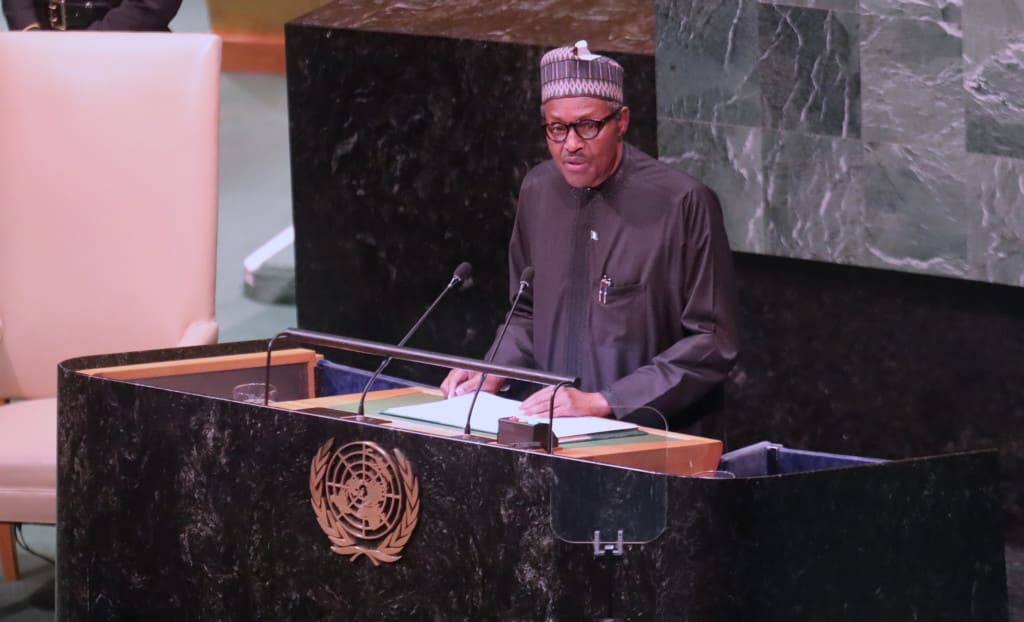
By Modupe Gbadeyanka
“For my administration, fighting corruption and Illicit Financial Flows (IFFs) in Nigeria is non-negotiable,” President Muhammadu Buhari has assured former President of South Africa and Chair of the AU/ECA High-Level Panel on Illicit Financial Flows from Africa, Mr Thabo Mbeki.
Mr Mbeki was in Abuja to meet Mr Buhari, who is also the current Champion of AU Anti-Corruption Campaign, to follow up on the efforts of AU Member States to implement the recommendations of the High-Level Panel Report (endorsed by the AU in 2015) and ultimately tackle IFFs nationally.
The visit also saw the Chair call upon the President in his capacity as the AU Anti-Corruption Champion to lead the efforts to engage action from other AU Member States towards tackling IFFs at the national, regional and continental level.
Prior to the Presidential visit, Mr Mbeki met with representatives of the Ministries, Departments and Agencies (MDAs) of the Federal Government of Nigeria which deal with Financial and legislative matters to gain an understanding of the country’s ongoing efforts to tackle Illicit Financial Flows.
In his remarks to the MDAs, the Mbeki recalled the 2015 Special Declaration to address IFFs, which was a realization by African leaders of the excessive losses due to illicit outflows. “The view was that the continent was losing resources which should have been available for its development to these illicit outflows,” he said. He emphasized the level of losses from IFFs, which at the time of the Panel’s Report was 50bn USD annually, but has now grown to about 80bn annually. He also indicated on a more positive note that, “Africa has led this agenda and brought it to global attention. This was evident when the African Heads of States asked our Panel to help address this issue”.
Mr Mbeki highlighted some of the recommended actions to address these IFFs saying that Nigeria and in turn, all other AU member states need legislation to deal with money laundering, financial intelligence and tax evasion. He underlined that this issue also requires action from global partners stressing, “since these funds leave the continent to destination countries, this problem cannot be solved by Africa alone. He acknowledged the capacity constraints nationally and continentally, saying, “As Africans, we must say that having identified the nature and size of the problem, we must work to address the issue. We need to act on this matter in any capacity necessary.”
The Deputy Executive Secretary and Chief Economist of the United Nations Economic Commission for Africa (ECA), Abdalla Hamdok for his part said that as a result of the Chair’s leadership, Africa was able to put the challenge of illicit finance on the global map. He referred to the Panel’s work and Report, whose impact has led to several important continental and global frameworks, including the Addis Ababa Action Agenda, as well as its inclusion in the Sustainable Development Goals.
As the Chair is required to report back to the AU Assembly of Heads of States and Government annually on the progress of implementing the recommendations of his Panel’s Report, Mr Hamdok said, “Several actions are being carried out, including this visit to Nigeria to determine the state of reaction to this issue, as well as “a technical project which is being worked on by the ECA to help capacitate AU member states against IFFs. Mr. Hamdok also stressed that all these efforts and those not yet mentioned are still, however, based on political will, which is crucial to reducing IFFs from the continent.
Attorney General of the Federation (AGF), Mr Abubakar Malami, for his part elaborated on Nigeria’s efforts to implement strategies to curb corruption and reduce IFFs. “We have taken major multi-dimensional policy decisions relating to institutions, legislations…and above all, recognizing the need for international collaboration as it relates to the fight against corruption and the minimization of illicit financial flows”. He noted that through legislative processes, Nigeria has “succeeded in establishing and capacitating institutions which are mandated with the statutory role of working to enforce financial regulations as well as tackle various misconducts including corruption and IFFs.”
He also detailed the efforts of the country in fighting corruption and IFFs through the deployment of relevant technology and international collaboration. Additionally, he highlighted the need for collaboration to make it more difficult for IFF perpetrators to move freely, invest in businesses and benefit from the proceeds of crime. He stressed that “we must work to repatriate these funds from the external perpetrators while working to detain them.
Permanent Secretary of Finance, Mahmoud Isa-Dutse delivered remarks on behalf of the Minister of Finance for Nigeria. In the speech, he commended the Chair and Panel for fighting this plague saying that IFFs have robbed Africa of the required wealth to help build schools, hospitals, roads and other necessary infrastructure. He added that the quest for Africa’s financial development will be accelerated if the efforts to recover these lost funds are successful and the continent’s development will no doubt receive a necessitated boost. In this regard, he spoke about the work of the Nigerian Extractive Industry Transparency Initiative (NEITI), which is being led by the Minister of Finance. This effort has helped the country recover lost assets from taxes because of the increased transparency.
The two-day event culminated with a technical workshop with Thabo Mbeki. Raymond Baker, President, Global Financial Integrity and Member of the High-Level Panel as well as the Secretariat of the Panel meet with the representatives of the financial agencies and departments. Part of the objectives of the workshop was to discuss the ECA’s proposed Development Assistance Project which aims to support Nigeria and other member states in the fight against IFFs. Following this visit, the Secretariat is expected to further engage the government of Nigeria and foster collaboration to build its capacity to stem IFFs from the country.
Economy
Stronger Taxpayer Confidence, Others Should Determine Tax Reform Success—Tegbe

By Modupe Gbadeyanka
The chairman of the National Tax Policy Implementation Committee (NTPIC), Mr Joseph Tegbe, has tasked the Nigeria Revenue Service (NRS) to measure the success of the new tax laws by higher voluntary compliance rates, lower administrative costs, fewer disputes, faster resolution cycles, and stronger taxpayer confidence.
Speaking at the 2026 Leadership Retreat of the agency, Mr Tegbe said, “Sustainable revenue performance is built on trust and efficiency, not enforcement intensity,” emphasising that the legitimacy and predictability of the system are more critical than punitive measures.
He underscored that the country’s tax reform journey is at a critical juncture where effective implementation will determine long-term fiscal outcomes.
The NTPIC chief stressed that tax policy must serve as an enabler of governance, and should embody simplicity, equity, predictability, and administrability at scale.
These principles, he explained, foster voluntary compliance, reduce operational friction, and strengthen investor confidence. He warned that ad-hoc adjustments or policy drift could undermine reform momentum, unsettle businesses, and deter investment, which thrives on predictable rules rather than shifting announcements. Structured sequencing, clear transition mechanisms, and continuous feedback between policymakers and administrators are therefore critical to sustaining reform credibility.
Mr Tegbe further argued that revenue reform cannot succeed in isolation. Achieving sustainable gains requires a whole-of-government approach, leveraging robust taxpayer identification systems, integrated financial data, efficient dispute resolution, and harmonised coordination across federal and sub-national levels. This approach, he said, reduces leakages, eliminates multiple taxation, and reinforces confidence in the system.
He noted that the passage of four new tax laws marks only the beginning of a broader reform agenda, describing the initiative as a systemic recalibration of Nigeria’s fiscal architecture, rather than a routine policy update.
He further asserted that the true measure of success will be the credibility of implementation, not the design of the laws themselves.
The NRS, he noted, functions as the nation’s “Revenue System Integrator,” with outcomes reflecting the strength of an interconnected ecosystem that encompasses policy clarity, enforcement consistency, digital infrastructure, dispute resolution efficiency, and intergovernmental coordination.
Economy
NUPENG Seeks Clarity on New Oil, Gas Executive Order

By Adedapo Adesanya
The National Union of Natural and Gas Workers (NUPENG) has expressed deep concern over the Executive Order by President Bola Tinubu mandating the Nigerian National Petroleum Company (NNPC) Limited to remit directly to the federation account.
In a statement signed by its president, Mr William Akporeha, over the weekend in Lagos, the union noted that the absence of detailed public engagement had naturally generated tension within the sector and heightened restiveness among workers, who are anxious to know how the new directive may affect their employment, welfare and job security, especially as it affects NNPC and other major operations in the oil and gas sector.
It pointed out that the industry remained the backbone of Nigeria’s economy, contributing significantly to national revenue, foreign exchange earnings, and employment.
The NUPENG president affirmed that any policy shift, particularly one introduced through an Executive Order, has far-reaching consequences for regulatory frameworks, Investment decisions, operational standards, and labour relations within the sector.
According to him, “there is an urgent need for clarity on the scope and objectives of the Executive Order -What precise reforms or adjustments does it introduce? “Its implications for the Petroleum Industry Act -Does the Order amend, interpret, or expand existing provisions under PIA?
“Impact on workers and existing labour agreements-Will it affect job security, conditions of service, Collective Bargaining agreements or ongoing restructuring processes within the industry? “Effects on indigenous participation and local content development -How will it affect Nigerian companies and employment opportunities for citizens?”
He warned that without proper consultation and explanation, misinterpretations of the Executive Order may spread across the industry, potentially destabilising operations and undermining industrial harmony that stakeholders have worked hard to sustain.
“Though our union remains committed to constructive engagement, national development and stability of the oil and gas sector, however, we are duty-bound and constitutionally bound to protect the rights and welfare and job security of our members whose livelihoods depend on a clear, fair and predictable policy framework,” Mr Akporeha further stated.
Economy
Uzoka-Anite Warns Against Inflation Risks from Oil, Gas Earnings Surge

By Adedapo Adesanya
The Minister of State for Finance and chairman of the Federation Account Allocation Committee (FAAC), Mrs Doris Uzoka-Anite, has cautioned that a projected surge in oil and gas revenues following President Bola Tinubu’s latest executive order could trigger inflationary pressures and exchange rate volatility if not carefully managed.
She said that the recent executive order mandating the direct remittance of certain oil sector revenues to the federation account would provide regulatory clarity and significantly strengthen revenues accruing to the federation account, but warned that sudden liquidity injections into the economy may complicate monetary policy coordination with the Central Bank of Nigeria and erode the real value of allocations to federal, state and local governments.
While addressing members of FAAC in Abuja, Mrs Uzoka-Anite commended President Tinubu on the order, describing the development as a structural fiscal correction aimed at restoring constitutional discipline to petroleum revenue management and enhancing distributable income across the three tiers of government.
She said that the revenue outlook was improving due to ongoing structural reforms introduced by the Federal Government.
According to her, the newly implemented tax reform measures are broadening the tax base, improving compliance and enhancing administrative efficiency.
“Also, the executive order signed by Mr President on February 13 is reinforcing revenue discipline in the oil and gas sector and reducing leakages,” she said.
The minister said that the order suspends the 30 per cent allocation to the Frontier Exploration Fund (FEF) and suspends the 30 per cent management fee on oil and gas profit payable to NNPC Limited.
She said that the order also directed that gas flare penalties be paid into the federation account, and mandated full remittance of petroleum revenues without unconstitutional deductions.
Mrs Uzoka-Anite said that the reform marks a shift from a retention-based oil revenue model to a gross remittance, federation-first model.
“The implications for FAAC are very significant; more oil and gas profit will now flow directly into the federation account.
“Gas flare penalties will become distributable revenue, and previously retained management fees will no longer reduce remittable inflows,” she said.
She said that the reforms were expected to result in higher monthly gross inflows into the federation account, and increased allocations to federal, state and local governments.
The minister said that a retrospective audit of the FFF, the Midstream and Downstream Gas Infrastructure, was due, and NNPC management fee deductions could lead to recoveries that may provide a one-off fiscal boost.
She welcomed the improved revenue outlook and cautioned against the risks associated with sudden liquidity injections.
“Experience shows that when revenues rise sharply and are distributed fully and immediately, large liquidity injections can increase inflationary pressures, complicate monetary management and reduce the real purchasing power of allocations,” she said.
She said that excess aggregate demand, exchange rate pressure, asset price distortions and inflationary risks could arise if increased inflows were not carefully managed.
Mrs Uzoka-Anite said that to mitigate such risks, she proposed phased disbursement of one-off recoveries.
She suggested that retrospective recoveries be staggered rather than injected into the economy in bulk, with a portion temporarily warehoused in a stabilisation buffer.
She also recommended strengthening the excess crude and stabilisation buffer mechanism to channel part of incremental inflows into a fiscal stabilisation window.
“This could offset revenue shortfalls in weaker months and reduce procyclicality in spending.
According to her, enhanced coordination with the CBN would be pursued to align fiscal injections with liquidity management tools and support open market operations where necessary.
Mrs Uzoka-Anite urged states and federal Ministries, Departments and Agencies (MDAs) to prioritise capital expenditure over recurrent expenditure.
She called for investment in infrastructure, agriculture, energy and other productive sectors, and avoid unsustainable wage or consumption spikes.
“Productive spending expands supply capacity and mitigates inflation,” she said.
She also announced plans to introduce monthly revenue transparency dashboards, production-to-remittance reconciliation reporting, and clear reporting of incremental inflows arising from tax reforms and the executive order.
The junior finance minister said that the reforms presented an opportunity to deepen fiscal federalism, enhance distributable revenue, restore constitutional clarity and strengthen trust among tiers of government.
She also advised that increased revenue must not translate into fiscal complacency.
“We must resist the temptation to treat incremental inflows as permanent windfalls. We should reduce debt burdens, clear arrears responsibly, build buffers and invest in growth-enhancing sectors,” she said.
-

 Feature/OPED6 years ago
Feature/OPED6 years agoDavos was Different this year
-
Travel/Tourism10 years ago
Lagos Seals Western Lodge Hotel In Ikorodu
-

 Showbiz3 years ago
Showbiz3 years agoEstranged Lover Releases Videos of Empress Njamah Bathing
-

 Banking8 years ago
Banking8 years agoSort Codes of GTBank Branches in Nigeria
-

 Economy3 years ago
Economy3 years agoSubsidy Removal: CNG at N130 Per Litre Cheaper Than Petrol—IPMAN
-

 Banking3 years ago
Banking3 years agoSort Codes of UBA Branches in Nigeria
-

 Banking3 years ago
Banking3 years agoFirst Bank Announces Planned Downtime
-

 Sports3 years ago
Sports3 years agoHighest Paid Nigerian Footballer – How Much Do Nigerian Footballers Earn


